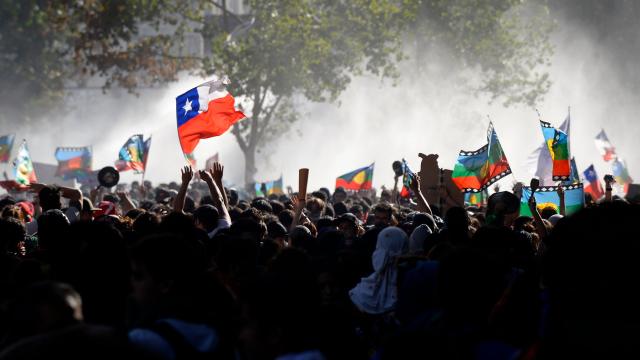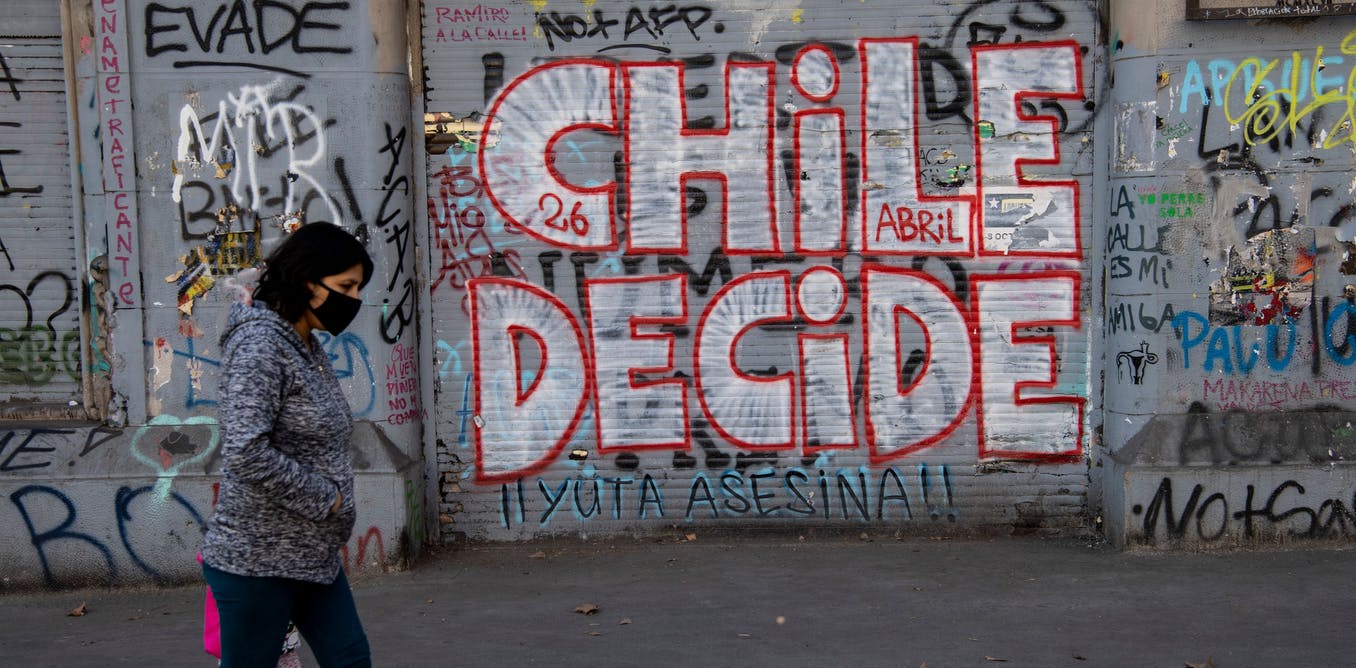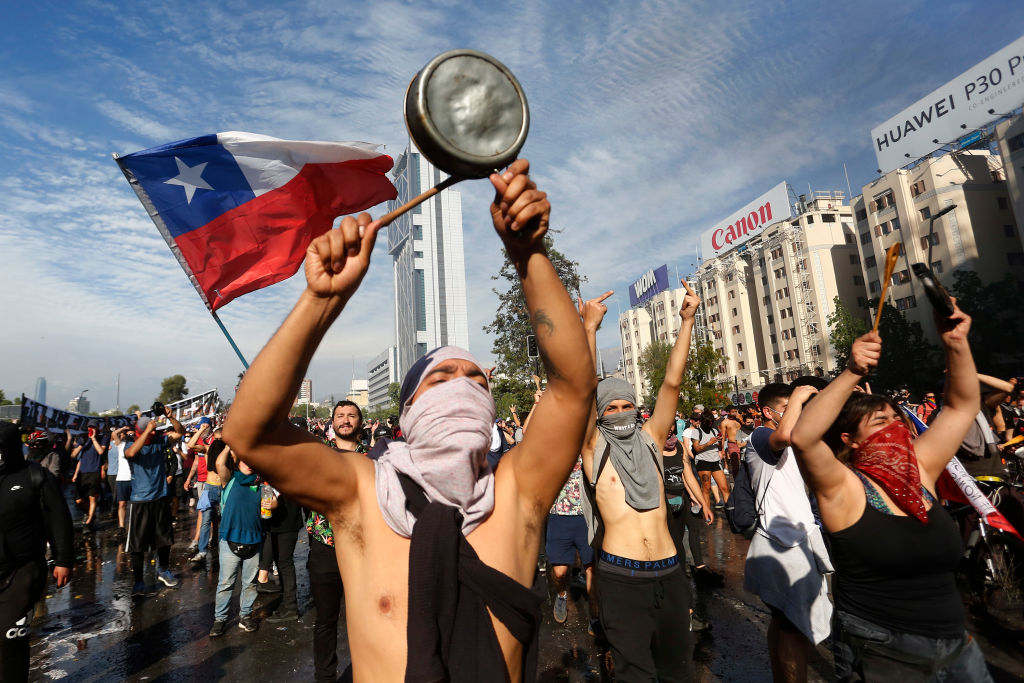
This is the 15th installment in a series about extending the Green New Deal to confront multiple global crises. Read Part I (Deconstructing environmental racism), II (Rural renewal), III (Upcycle the war machine), IV (GND manifestos), V (No oil bailouts), VI (No corporate ecocide), VII (Defund the police), VIII (Zero Covid approach: NZ), IX (Finnish equality lessons), X (Denmark stops drilling), XI (Costa Rica rewilding), XII (Indigenous justice) and XIV (No borders)
A deadly political system was first implemented in Chile, then caused destruction across the world: neoliberalism. This doctrine substantiates everything from corporations' “rights” to profit above ecological meltdown or human disasters to the 2008 banking crisis, and far more. Neoliberalism was first codified into law through the Chilean Constitution, for instance with laws that enshrined corporations' rights to privatize water, healthcare and education.
This constitution still remains in effect, but now it is being rewritten by the people. Chile's presidential election of Gabriel Boric in December 2021, and the political transformations driven by Chileans, are blazing trails to another world. Neoliberalism was first violently enforced on Chileans, and their long struggle shows how people-power can build something different – including changing the laws that have enabled the few to oppress the many.
Overcoming neoliberalism and the far-right
President-elect Boric's opponent in last December's election, José Antonio Kast, had championed General Pinochet during his dictatorship and, if elected, sought to return Chile to the Pinochet years (1973-90). Kast embodies the global far-right threat.
Kast specifically promised to extend neoliberalism in Chile and further oppress women, indigenous peoples, the LGBTQ community and migrants. He is an apologist for crimes of the Pinochet years, some of which are tied to his family.
His brother, Miguel, was Pinochet's Minister of State and a member of the Chicago Boys, a neoliberal group that helped design Chile's deadly experiment. The US attempted to oust a leftist democratic government of Chile in 1970, and aided the successful 1973 coup by Pinochet.
US-backed dictatorships are commonplace. What was truly revolutionary was how Chile created a constitution to benefit elites and corporations – one that was copied across the world, again influenced by the Chicago Boys.
Boric offers an alternative. He is a strong ally to the groups Kast attacks. The president-elect's manifesto includes public spending, plans to decarbonise society and reverse the deep injustices caused by Chile's neoliberal period. These crises were caused by Pinochet, and never resolved afterwards.
Yet Boric is more than a leftist politician aiming to break with the past. He is a figurehead for a mass movement, not only presenting transformative ideas and policies, but building a counter-power to make them reality.
From resistance to democratic (r)evolution
Since the 1973 military coup, Chileans have resisted and built solidarity against the dictatorship and neoliberalism. For instance, in May 1983, a national go-slow working day protest ended with an evening pots and pans protest. This kicked off concerted action causing Pinochet to lose a 1988 plebiscite, ending his rule.
But while Pinochet exited, his constitution remained. Chile faces astronomical inequality, remaining a place where elite and corporate power held sway. In waves of revolt, Chileans have taken collective action, including the long-standing struggle for indigenous rights; students' “Penguin Revolution” of 2006 and university student protests in 2011-13 demanding education rights; recent mass mobilisations against pension cuts; a feminist wave culminating in 2018 occupations and protests; and a 2019-20 wave of “Social Outburst.”
From 1990 to 2021, Chile's supposed democratic transition did little for real structural change. The Chilean Constitution’s continued use meant the right to privatize and make profit over everything from water to education and healthcare. It narrowed rights to apply to property and profit, while upholding and extending power structures such as patriarchy, class and racism. Historian Joshua Frens-String explained that as far back as the 2006 school strikes, social movements realized Chile needed another constitution.
After nearly 50 years of fighting neoliberalism and authoritarianism, many Chileans have ample experience of resistance, including putting new president-elect Boric in power. He came to national prominence in the 2011 student protests. He was also at the forefront of efforts to realize a new constitution.
Amid this long history, it’s useful to focus explicitly on 2019 when a multitude challenged neoliberalism.
Social outburst and social power
A 30 peso ($0.04) hike in the price of the Santiago metro led to a mass avoidance of ticket barriers in October 2019. What followed was a cycle of police repression that escalated into a stronger revolt. Between October and February 2020, police killed 36 and intentionally blinded over 400 people.
The outburst shut down Chile. Disrupted supply chains meant food was unavailable in shops that often remained closed, so people rekindled mutual aid kitchens – a solidarity action made frequent during the dictatorship. Neighborhoods also began forming local assemblies, spaces where people could discuss ideas and collectively imagine how Chile should be run.
Changing tack from state violence, in late 2019, President Sebastián Piñera offered some small concessions, but these were arguably too little, too late. By November 2019, the Chilean Congress agreed to hold a referendum. More than 78 percent voted in favor of a new constitution in October 2020. The constitution is being prepared by 155 Chileans elected in May 2021. It will be finalized and put for ratification by the entire population in late 2022.
The constitution process created a tangible means to create transformative change. A people-led process is the polar opposite of a small clique writing laws to extend establishment and corporate powers. Of its 155 elected members, half are women, coming from a broad range of backgrounds. It has the same proportion of indigenous people who live in Chile, and academic Elisa Loncón from the Mapuche indigenous nation was chosen to oversee its process.
Many of these 155 members are activists, including environmentalists, feminists and indigenous leaders. Overall, there is a majority calling for change. This means the constitution, when it is finalized, will be expected to protect indigenous peoples, end patriarchal laws, defend women and provide public services, including the right to clean water and rights to nature.
Game-changer
The transformation in Chile, while manifesting itself through the new constitution, has more elements as well. One important aspect is the way Chileans have created a broad front and coalitions – spaces where diverse movements and small parties can collaborate. Second is the diversity of approaches, a plurality of movements occupying power at all levels, from squares to streets, from municipal governments to national elections.
At the same time, Chile's path to a democratic and green future faces challenges. Kast might be defeated, yet he is the latest figurehead for the corporate and establishment vested interests, at home and abroad. This rightwing power will do everything to subvert and sabotage the new presidency, the constitution and the social movements.
The takeaway from Chile, then, is this: to transform the world, winning power and elections cannot be enough. Real change requires building power through all levels of society, then using that power as a platform to change the rules of the game.
Read Part I (Deconstructing environmental racism), II (Rural renewal), III (Upcycle the war machine), IV (GND manifestos), V (No oil bailouts), VI (No corporate ecocide), VII (Defund the police), VIII (Zero Covid approach: NZ), IX (Finnish equality lessons), X (Denmark stops drilling), XI (Costa Rica rewilding), XII (Indigenous justice) and XIV (No borders)


















